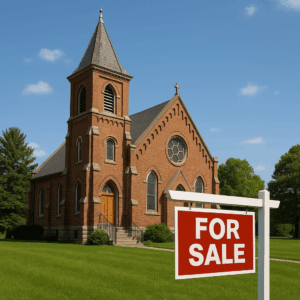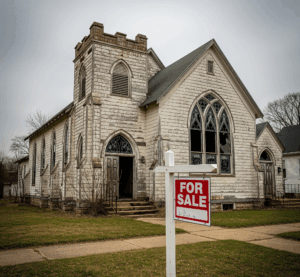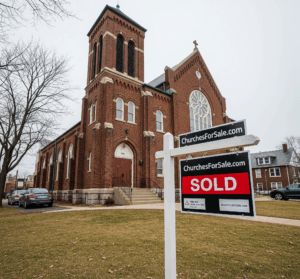
Avoid Hidden Traps: Church for Sale Due Diligence Checklist for Smart Leaders and Brokers
In the realm of real estate transactions involving church properties, few factors are as critical to a successful outcome as the proper execution of due diligence. Yet, across countless churches for sale, this pivotal process is too often neglected or rushed, with far-reaching consequences for congregations and stakeholders alike. Whether you are a church leader navigating the intricacies of a first purchase or a seasoned real estate broker assisting clients in the faith sector, understanding why thorough due diligence matters—and what it truly entails—can help safeguard your mission and community for decades to come.
Imagine, for a moment, a vibrant faith community brimming with hope after securing funding for their ideal property, only to discover unforeseen legal entanglements that jeopardize their plans months after closing. Such scenarios, as unfortunate as they are common, underscore the necessity of comprehensive investigation before any church for sale changes hands.
The path from identifying the right church for sale to celebrating a smooth closing is rarely straightforward, particularly when the history and requirements of religious properties add layers of complexity. Churches stand as unique entities on the real estate landscape, with missions, legacies, and congregational investments that make them far more than simply bricks and mortar. For leadership teams and trustees, the due diligence phase represents an opportunity to not only verify the soundness of a transaction but to honor the spiritual and practical commitments of their flock. A real-world example involves a congregation excited about a historic church for sale, delighted by its stunning architecture and ample gathering spaces. Years of fundraising and prayer culminate in a contract—only for city code violations and long-standing structural issues to surface, leading to costly delays and a shaken congregation.
Overlooking essential aspects during the due diligence process can spell disaster for churches for sale, where the stakes go beyond financial loss to impact reputations, faith journeys, and community outreach. Often, challenges emerge from a lack of expertise or underestimating the specialized nature of ecclesiastical facilities. Brokers and church executives alike benefit from recognizing that local zoning laws, previous land use, and denominational governance can dramatically affect a property’s viability for worship and service. It’s not uncommon for vibrant ministries to purchase a church for sale, investing limited funds, only to later learn about parking limitations, easement disputes, or environmental restrictions that prevent full use of the facility. Such missteps can derail the momentum of even the most committed faith communities.
What sets real estate transactions involving churches apart is their fusion of spiritual mission and pragmatic considerations, placing extraordinary significance on every due diligence step. Navigating these deals demands more than transactional knowledge; it requires a heart for ministry and a head for details, blending vision with vigilance at every stage. Many churches for sale continue to be governed by conditions set decades prior, whether through restrictive covenants, historical designations, or denominational oversight, each representing a potential source of conflict if overlooked. Picture a scenario in which a congregation purchases a seemingly perfect property, only to later confront clauses that forbid certain types of ministry programming or renovations, threatening the very outreach goals that prompted their move in the first place.
For leaders and brokers engaged in churches for sale, it is essential to approach each transaction as both a faith journey and a business endeavor, embracing diligence with the same zeal invested in mission planning. The peace of mind gained through methodical research and careful vetting cannot be overstated, particularly when the future of a congregation lies in the balance. All too often, well-meaning partners rush to celebrate new beginnings, celebrating before the ink dries on vital inspections, verifications, and negotiations. Yet, it is precisely this commitment to detail—rooted in prayerful discernment and professional best practices—that lays the groundwork for lasting ministry growth. As this article will explore, inadequate due diligence represents the number one pitfall in church real estate, and the stories behind that pitfall offer invaluable lessons to all who support churches for sale.
Legal and Title Due Diligence for Churches for Sale
One of the most critical pillars of due diligence when managing church properties is legal and title research, which too many church leaders underestimate. A hypothetical team, attracted by an affordable church for sale in a thriving urban area, quickly signs a purchase agreement without examining title records. Only later do they discover a series of unresolved liens and a restrictive covenant dating back decades, preventing the property from being used for any non-liturgical gatherings. The legal ramifications force the congregation into court battles, draining resources and leaving the once-hopeful buyers disillusioned.
Title investigations cannot be relegated to a mere box-checking exercise, since many church properties have histories involving multiple bequests, denominational trusts, or informal transfers. Brokers and church decision-makers must insist on a full title search performed by a reputable title company with specialized experience in religious properties. For instance, one congregation seeking to buy a church for sale in a rural community learns through due diligence that the land is officially owned by a parent denomination, requiring specific approval from a governing board—an oversight that could have voided their purchase entirely had it not come to light.
Another essential legal step is the verification of underlying zoning and permitted uses. Too often, churches assume any house of worship designation fits their intended activities, not realizing local ordinances may restrict gatherings, renovations, or even parcel combinations. Imagine the disappointment of a bilingual community group buying a church for sale, only to learn their outreach programs to immigrants fall outside the “religious use” allowed by local code. Proactive engagement with city planners and municipal attorneys becomes a vital ingredient in the due diligence toolkit for every church-for-sale transaction.
Easements and right-of-way issues can create significant obstacles for new church property owners, particularly if access routes or parking facilities are shared with neighboring buildings or subject to municipal claims. Even experienced brokers can miss obscure easement agreements that, if enforced, could greatly limit property expansion. A well-documented example involves a fast-growing church that purchased a church for sale, only to be sued by a neighboring business claiming shared rights to a crucial parking lot, severely curtailing Sunday attendance until the dispute was resolved.
Finally, nonprofit and religious exemption considerations must be documented with care during any church real estate transaction. Local governments may require new nonprofits to reapply for property tax exemptions or complete documentation verifying their 501(c)(3) status in order to avoid unexpected taxes in the future. Failure to confirm these requirements has left more than one congregation with unexpected losses and headaches, threatening budgets and ministries alike.
Physical and Environmental Considerations for Churches for Sale
The physical inspection phase of due diligence is an arena where churches for sale regularly trip up, often swayed by the charm of stained glass and steeples over solid mechanics. A hypothetical congregation, enthralled by the grandeur of a century-old sanctuary on the market, waives a full inspection to expedite the deal. Months after closing, recurring basement floods and roof leaks reveal severe deferred maintenance, resulting in repair costs that dwarf the original purchase price and force painful ministry cutbacks.
Structural evaluations must extend beyond the obvious, incorporating not only roofing, HVAC, and foundation checks but also detailed reviews of electrical, plumbing, and fire safety systems. Many older church buildings harbor hidden dangers, like outdated wiring or non-compliant accessibility features, which present not only safety hazards but also liability exposures for leadership teams. A case study might involve a church for sale with elaborate historic pipes and organs, only to discover after purchase that the electrical system poses constant fire risks.
Environmental due diligence often goes unnoticed in the eagerness to claim a new spiritual home, but failure in this area can stymie long-term plans and rack up unforeseen costs. Particularly in urban and suburban settings, church properties can be subject to outdated oil tanks, lead paint, asbestos, or even soil contamination from prior commercial uses. Suppose a congregation excitedly closes on a downtown church for sale, then discovers expensive environmental remediation is needed to comply with local regulations before hosting children’s programs—an unbudgeted hit that strains their financial base.
Accessibility compliance deserves a special mention, as the Americans with Disabilities Act (ADA) and other local codes require facilities to be accessible to those with limited mobility. Churches often struggle to retrofit older buildings for ramps, elevators, and accessible restrooms, sometimes learning only after purchase that compliance upgrades are not only necessary but prohibitively expensive. Had the hypothetical buyers required a comprehensive ADA review, they could have negotiated seller contributions or selected a property more aligned with their capabilities.
Building code compliance and capital improvement projections round out the physical due diligence checklist for every church property under consideration. Imagine a broker and leadership team failing to obtain a certificate of occupancy or neglecting to plan for needed deferred maintenance over the next decade. These oversights result in constant operational interruptions or budget shortfalls, undermining the very ministry purpose that inspired the search in the first place.
Financial and Operational Due Diligence for Churches for Sale
Financial stability is the backbone of any successful church-for-sale transaction, and inadequate attention here can lead to disastrous consequences. A hypothetical scenario unfolds when an excited congregation purchases a large campus, impressed by initially low listing costs. Only after closing do they realize that high utility expenditures, deferred maintenance, and insufficient reserves threaten their ability to meet even basic operating expenses, putting the survival of the ministry at risk.
Careful analysis of operating costs, reserve studies, and capital improvement needs is mandatory before committing to any church for sale. Leadership teams must commission or review expert financial appraisals, scrutinizing historical operating expenses and maintenance logs to anticipate future needs. A wise practice is to require sellers to provide two or more years of audited financials, allowing buyers to accurately budget and forecast both regular and extraordinary costs.
Insurance requirements for houses of worship are often misunderstood, as coverage needs extend well beyond simple property insurance to include liability, directors and officers’ coverage, and worker’s compensation. Many churches for sale feature outdated coverage policies, or none at all for unique ministry activities, putting new owners at risk for legal liabilities. One hypothetical congregation learns after closing that their new property’s insurance does not cover outreach events, leading to a catastrophic loss after vandalism at a community festival.
Churches For Sale Article: Why Every Church Needs Fractional CFO Services Now
Analysis of giving trends and financial health within the congregation is also a critical, yet sometimes overlooked, element of due diligence. While a new space might seem affordable on paper, leadership must realistically match fundraising capacity and pledged income to both purchase price and operating costs going forward. In one case, a church’s leadership was so eager to secure a spacious facility closer to the city center that they overestimated their congregation’s ability to cover debt service—leading to a regrettable need to sell and relocate again within just a few years.
Lastly, churches for sale should prompt an operational audit, with detailed consideration of staff capabilities, technology needs, and ministry program requirements. Are administrative systems and volunteer processes equipped to manage a larger, more complex property? Will existing staff be able to handle the increased load of maintenance, events, and compliance obligations? A leadership team that fails to answer these questions may soon find themselves stretched too thin, with essential ministry programs suffering as a result.
Congregational and Community Due Diligence for Churches for Sale
The relational and communal dimensions of due diligence can be as decisive as legal or financial considerations in determining the ultimate success of a church for sale transaction. Congregational buy-in and clarity of vision are essential, ensuring that all stakeholders feel heard and represented in the property decision. In a hypothetical example, a church board pushes through a property acquisition despite vocal concerns from youth leaders and elder members, resulting in years of tension and eventual membership decline.
Community context should be at the heart of every transaction involving churches for sale, as the location and accessibility of a property directly impact outreach and growth. It is not enough to select properties on price and footprint alone; leadership teams must study surrounding demographics, neighborhood needs, and mission alignment. One congregation that purchased an underutilized facility in a declining area found their ministries struggling to engage the local community, leading to underuse and financial drain.
Effective leaders utilize surveys, town hall meetings, and focus groups to ensure that the entire congregation is invested in the vision for the new property. Too often, leaders make unilateral decisions, only to encounter resistance or apathy when it comes time to launch new initiatives. By involving all age groups and ministry leaders in the due diligence process, churches increase the likelihood that new spaces will be harnessed for creative, impactful programming.
Neighbor and community relations can determine whether a newly-relocated church thrives or falters. Before completing the purchase of any church for sale, it’s wise to investigate existing relationships with neighborhood associations, local government, and community organizations. In one scenario, a church failed to learn about an ongoing dispute with neighbors about noise and parking prior to closing—adding months of legal wrangling and negative publicity to their move.
Finally, clear and transparent communication is the capstone of congregational due diligence, ensuring that hopes and fears are addressed honestly at every stage. By developing thorough transition plans, celebrating milestones, and providing regular updates, leaders build the trust needed to weather the inevitable challenges that accompany any church property transition.
Conclusion
In conclusion, the process of acquiring a church for sale is far more than a standard real estate transaction; it is a journey that will shape the mission, ministry impact, and financial health of a congregation for years to come. Across each step of the due diligence process—legal research, physical review, financial analysis, and community engagement—leadership teams hold the responsibility and privilege of stewarding both property and vision with equal care. The stories of congregations who rushed to acquire their dream churches underscore the high stakes involved, with missteps often translating to costly errors that set ministries back for years. By learning from these experiences, church leaders and real estate brokers can enter each transaction with eyes wide open, operating as wise stewards entrusted with resources for God’s work.
It is essential to recognize that every church for sale comes with its own unique history, opportunities, and challenges, demanding tailored investigation and prayerful discernment. Neither enthusiasm nor urgency can replace the careful work of researching titles, inspecting plumbing and structural integrity, balancing financial projections, and ensuring harmony within the faith community and surrounding neighborhood. Each hypothetical scenario and real-world example presented here highlights both what can go wrong and how proactive due diligence can prevent future heartache.
Churches For Sale Article: 8 Common Pitfalls in Church Real Estate Transactions
For those tasked with shepherding their congregations through periods of transition and growth, investing in rigorous due diligence is a tangible way to honor both past and future generations of faithful members. The stakes are undeniably high—financially, legally, and spiritually—but so too are the rewards of a successful, mission-aligned property purchase. Each detail checked, each consultation and inspection completed, moves your church a step closer to the stability and excitement that new spaces can offer.
The world of churches for sale is as varied and rich as the communities they serve, and there is no one-size-fits-all roadmap to success. Yet, by prioritizing diligence, transparency, and collaboration, leadership teams and real estate professionals can navigate even the most complex transactions with confidence. In doing so, they ensure that every new sanctuary, fellowship hall, and ministry center stands as a testament not only to vision, but to the wisdom and care behind its acquisition.






